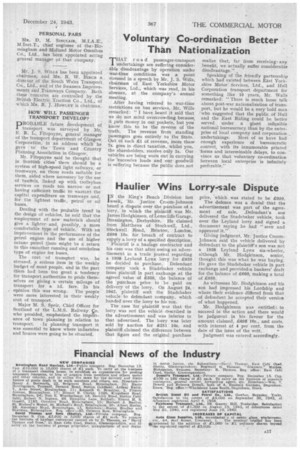Voluntary Co-ordination Better Than Nationalization
Page 19

If you've noticed an error in this article please click here to report it so we can fix it.
'THAT road passenger-transport I undertakings are suffering considerable disadvantage by operation under war-time conditions was a point stressed in a speech by Mr. J. S. Wills, chairman of East Yorkshire Motor Services, Ltd., which was read, in his absence, at the company's annual meeting.
After having referred to war-time restrictions on bus services, Mr. Wills remarked: " I have heard it said that we do not mind overcrowding because, it puts Money in our pockets, but you know this to be the reverse of the truth. The revenue from standing passengers goes entirely to the State. Out of each 41 of revenue, more than. 7s. goes in direct taxation, whilst you, the shareholders, receive only 1s. Our vehicles are being worn out in carrying the '"excessive loads and our goodwill is suffering because the public does, not
realize that, far from receiving any benefit, we actually suffer considerable disadvantage."
Speaking of the friendly partnership .
which had existed between East Yorkshire Motor' Services, Ltd., and Hull Corporation transport department for something like 10 years, Mr. Walls remarked: " There is much loose talk about pot-war nationalization of trans port, but he would be a very bold man who suggested that the paha of Hull
and the East Riding could be better served under a giant inflexible. national bureaucracy than by the enterprise of local company and corporation _
undertakings. Most of us have had enough experience of bureaucratic control, with its innumerable printed 'forms and interminable delays, to convince us that voluntary co-ordination between local enterprise is infinitely preferable."




















































